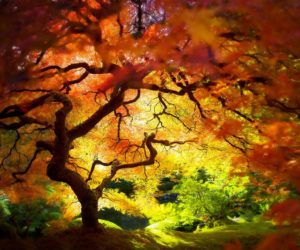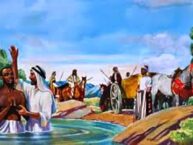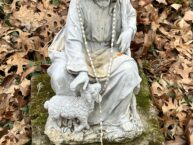 March 24, 2019: May God’s words alone be spoken, may God’s words alone be heard. Amen.
March 24, 2019: May God’s words alone be spoken, may God’s words alone be heard. Amen.
Last year I told you a story about “…a woman who dreamed she walked into a brand-new shop in the marketplace and, to her surprise, found God behind the counter.
“What do you sell here?” she asked.
“Everything your heart desires,” said God.
Hardly daring to believe what she was hearing, the woman decided to ask for the best things a human being could wish for. “I want peace of mind and love and happiness and wisdom and freedom from fear,” she said. Then as an afterthought, she added, “Not just for me. For everyone on earth.”
God smiled, “I think you’ve got me wrong, my dear. We don’t sell fruits here, only seeds, water, and manure.”[1]
I bring this story up again, because it kept coming to my mind this week – and no, not because of the Powerball lottery (and if you won that, I want to speak with you after church). No, it was as I meditated on the scripture passages for this Sunday, and if there is one thing I have learned, if something keeps popping up in your head when meditating on scripture – best not to ignore it. I think God kept planting that in my head, because of the connectedness of it with the Exodus narrative, the Psalm, and the Gospel – readings that if we pay close attention, resonate with how most of us feel at some point in our lives…and help us move beyond the superficial to the profound.
Let’s begin with the rather strange gospel passage. The disciples lament to Jesus about the brutal slaughter by Pilate of 18 people (yeah – not the sweet philosophical guy we hear about from the Gospel of John on Good Friday – that is not who he was). And like so many of us, they seek an answer. They want to know why it happened. Somehow, it must have been their fault – they must have caused it. It is something I also, as most priests, hear when visiting with people in their darkest hour. “Why did God do this?” We seek an ability in these times to understand – mostly so it seems manageable, it is a way to find control in the uncontrollable. And so they turn to Jesus for an answer.
Jesus tells them they have God all wrong – that those people who were killed led no more worse a life than anyone else, even bringing into the mix those killed by a tower falling on them. He then told them a parable about a fig tree that has borne no fruit. The man who had asked that it be planted came to the gardener one day and told him to cut it down. But, the gardener, who one might reasonably guess had planted the seed and nurtured it until this point, implored him to give the tree more time, that he would tend to it with more manure and water. If it still doesn’t bear fruit in the next season, there is still an opportunity to cut it down.
Okay, what was that all about? And, what is it with Jesus and fig trees? One way to think of this is that Jesus is talking about all the ways we die – physically, like those killed by the tower and by Pilate, and also those who are the walking dead – the ones, like that tree, that are physically alive, but spiritually empty of life. None of it, he is saying, is caused by God, but by humanity and the nature of our very human existence. And, he is also telling us something else – something that woman heard in her dream. Something we all need to hear.
But let’s step back for a moment to the psalm, because it is connected to the lament of the disciples about the deaths of those Galileans, and to Jesus’ answer. How many of you have felt deeply the words of the psalmist who writes “O God, you are my God; eagerly I seek you; my soul thirsts for you, my flesh faints for you, as in a barren and dry land where there is no water.” As a priest, I have sat beside many of those who cry out from the dryness of their soul, from the barren and dry land of their despair, for the waters of hope, joy, forgiveness, love – for the relief from their pain, restoration of health for their loved one (or themselves), resurrection from their emotional or spiritual death.
This human life of ours is not easy. There are terrible things that happen in the world, in no less a way than what happened to the Galileans of the gospel. We need only remember all the victims of natural disasters, of gun violence, of bigotry and hate. Or be reminded of loved ones lost to disease – physical, mental, or emotional. We know in those times the thirst for God to bring life to the barren desert and quench our longing for things to be different.
Do you know who else felt that way? Moses.
And we hear about him in the passage from Exodus today. It is that classic pyrotechnic Sunday School story of the burning bush. Now, to understand what is really happening here, and there is a LOT happening, we would need several sermons. But being Episcopalian, let me give you the Cliff Notes version, because who Moses is in that moment, and what happens to him matters a lot, and it is related to what Jesus is telling us too.
To start, we need to abandon the Charlton Heston image most of us have of this awesome strong, charismatic, good looking guy with an unwavering faith that we see in that cinematic classic “The Ten Commandments.” That makes for great movies out of Hollywood, but it isn’t the man we hear about in the Hebrew scriptures.
Moses was born to a Hebrew woman at a time when the male children of Hebrews were ordered to be killed by the ruler of Egypt, the Pharaoh. Now you all likely know this story as much as the one about the burning bush. She hides him in a basket, puts the basket in the river, and he is found by one of Pharaoh’s daughters. In a great plot twist that not even Hollywood would think of, his Hebrew mother is paid to nurse and raise him. Then he lives as an Egyptian, and a rich one at that, until he sees an Egyptian beating a Hebrew slave. Moses intervenes killing the Egyptian. This is NOT good.
So, he flees to Midian to escape the Pharaoh’s wrath where he ends up marrying a woman he meets at a well (the match.com of those days), and they have a son he names “Gershom; for he said, ‘I have been an alien residing in a foreign land.” Which, not for nothing one could argue that he had been all his life, you know – being a Hebrew in the land of Egypt, but no matter – he just doesn’t seem to feel like he belongs anywhere.
So he is out one day tending his sheep, and goes out “beyond the wilderness” as the text says. And I think that is important to think about – that “beyond the wilderness” part. Here’s this guy – separated from the people of his birth, separated from the people who raised him, living in a foreign land. Perhaps this wasn’t beyond the wilderness to him at all, but was where he felt the world matched his life – a place that was beyond desolate, beyond the possibility for life. He was a man who thirsted for something…his soul aching for what he didn’t really know.
And then he ends up, perhaps unwittingly, at the foot of the mountain of God, where he turned from what was on his mind, turned from where he was heading, turned to see a sign of God’s grace in his midst. Okay, granted it was kinda hard to miss, don’t ya think? I mean, a bush on fire would be striking, but a bush on fire and not burning? Well, that is just a freakingly amazing wonder to behold. I think most of us would stop in our tracks for that, right – well, that is if we actually put down our phones long enough to see it. Then again, we still wouldn’t experience it, right, we’d just start recording it – living life through the lens of a camera. But back to Moses… Now, you gotta love what he said here in that moment – Moses said, “I must turn aside and look at this great sight, and see why the bush is not burned up.” Ya think?
Oh, but it gets better, because God’s voice comes out of the bush, and tells him that he is standing on Holy ground. Holy ground! Holy what? I can just imagine Moses saying that – Holy …well, fill in the blank with something I can’t say from the pulpit, right? And from that point forward, Moses will never be the same – his life, which had felt barren, desolate, and without a sense of belonging, was changed in that time on Holy ground. His thirst was quenched, he was given new life – a life that would transform other lives. He, the one who had felt so dead inside, would feed the ones whose souls longed for nourishment.
Holy ground is like that… We hear this too in the psalm, because until this point, I have focused on the opening passage in which the author is yearning for God. But the next verse then says “Therefore I have gazed upon you in your holy place, that I might behold your power and your glory.” And in that seeing, that being on holy ground, the psalmist finds nourishment too, writing “My soul clings to you, your right hand holds me fast.”
And in no less a way than our buddy Moses and the Psalmist, these holy ground moments will change us…if we recognize them. You may not realize it, but you have walked on Holy ground too, but perhaps because there was likely no burning bush it didn’t seem like that to you (and if there wasa burning bush – you are preaching next Sunday, just sayin’). One commentary spoke about it like this “Here are a few other places that could be holy ground:
You are taking a walk when an idea occurs to you about some change you need to make in your life.
You are reading a book when something you have read suddenly comes alive for you.
You are in the midst of an argument with a family member and are quite angry when something clicks inside your head and you remember that you love this person you are so angry at. That realization can cause the ground to shift under you, and there is suddenly a holy opportunity regarding your relationship with that person.
You are snowed in and unable to get to your workplace. You are frustrated because you’ve got so much you need to accomplish, but then it suddenly dawns on you that you have been given a gift – a day to find yourself again.
You are busy with the responsibilities of the day when a child asks you to read her a story.
You are in the midst of trouble or are depressed over the course of life, and receive one of those “I’m thinking of you” cards from a friend.
Those examples…may or may not seem like religious experiences…Yet if we have any acquaintance with the concept of holiness, we will recognize that there are elements in moments such as those described that go beyond the ordinary, beyond the routine, beyond the mundane.”[2]
So make no mistake about it – these are holy ground moments where signs of God’s grace are waiting for us to see – waiting for us to turn to look, to take a moment to stand and to drink in the water of life, to be fed the nourishment of God’s love, and then to feed others.
And you don’t have to go looking for them, you don’t have to go out beyond the wilderness – they are all around you – you just have to be willing, like Moses, to see them. Even at this moment, you are on holy ground – right here – experiencing the grace of God rooted in the sacrament of baptism and nourished in the sacrament of the Eucharist.
The dream that woman had was spot on. God plants seeds, and nourishes them. We are those seeds! And here’s the thing – we are planted in holy ground– which, if you haven’t figured it out by now is – everywhere – all of creation – in all living things. Or, as the poet Elizabeth Barrett Browning wrote:
“Earth’s crammed with heaven, And every common bush afire with God, But only he who sees takes off his shoes;”
And we need to see – we need to recognize the God who planted us, who yearns to nurture us, because when we don’t we become that dead tree. We do not grow, and we cannot feed others, and we can’t just walk into a store and ask God to give us fruit for ourselves and for the world.
We are seeds sprouted in holy ground – the holy ground of God’s wonderful creation, but the life of the human tree is not an easy one. It will be filled with joys and laughter, but also with pain and despair. There will be dark times that will try to rob us of the nutrients of light and love we need to grow. We may feel cursed and forgotten in these times, dead to the world…and most horribly to ourselves. But God will always meet us wherewe are to remind us of whowe are – wonderful creations rooted in holy ground, and nourished by the grace that is freely given to us.
In Lent we seek to return to God; that, nourished in this holy place with the food and drink of unending life in Christ, we may be the life giving and life receiving tree we were born to be, feeding others and growing in grace and love, rather than wasting away – dead to all but God.
Let us then open our eyes to receive Him who came not by burning bush, but to set our hearts on fire, that we might recognize the holy ground on which we stand, and grow to bear the fruit of love and peace for a starving world.
Amen.
For the audio from the 10:30am service, click below, or subscribe to our iTunes Sermon Podcast by clicking here:
[1]Adapted from Anthony de Mello, Taking Flight: A Book of Story Meditations, pg. 103.
[2]Homileticsonline.com
The Rev. Diana L. Wilcox
Christ Church in Bloomfield & Glen Ridge
March 24, 2019
Lent 3 – Year C
1st Reading – Exodus 3:1-15
Psalm 63:1-8
2nd Reading – 1 Corinthians 10:1-13
Gospel – Luke 13:1-9






